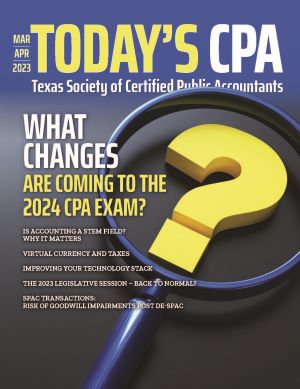Virtual Currency and Taxes
Tax Topics
By Roopa Srikanth, CPA
Virtual currency has tested the U.S. honor-based tax system. Though Congress and the IRS have tried to rein in and make taxpayers more accountable for trading in virtual currency, it is still an area where practitioners lack good guidance.
According to the IRS, virtual currency is a digital representation of value, other than a representation of the U.S. dollar or a foreign currency (“real currency”), that functions as a unit of account, a store of value and a medium of exchange.
In some cases, virtual currency is considered convertible currencies. In a sense, virtual currency has an equivalent value in real currency or acts as a substitute for real currency and is referred to as “convertible” virtual currency. Regardless, the IRS treats virtual currency as property and not the same a fiat currency.
The IRS first issued guidance on virtual currencies in Notice 2014-21. The importance of virtual currency is well noted when filing the individual tax returns on Forms 1040, 1040SR and 1040NR.
The first year in which the IRS requested that taxpayers provide some input on virtual currencies was 2019 and it appeared as a question on Schedule 1. Although it was a mandatory check the box, it was often overlooked if the taxpayer did not have Schedule 1 reportable income or adjustments.
Since then, the question has evolved and on the 2022 tax return, the virtual currency question on page 1 is more specific and captures the taxable transaction with “At any time during 2022, did you: (a) receive (as a reward, award or payment for property or services); or (b) sell, exchange, gift or otherwise dispose of a digital asset (or a financial interest in a digital asset)? All of the changes are meant to make taxpayers consider if there is a reportable transaction and possible taxable event.
It is to be noted that for 2022, the IRS expanded the scope of this question. This not only addresses virtual currency, but other digital assets such as stablecoins and nonfungible tokens (NFTs). These are beyond the scope of this article.
Taxability
As W-2 Income. If an employer pays an employee for services in virtual currency, it is treated as regular wages and is subject to federal, Social Security and Medicare withholding. The income will be the rate of virtual currency on the date of receipt.
Example 1: Assume the coin on the date of receipt of January 2021 wages was trading at $500. The taxpayer was paid 10 coins, so the income would be $5,000. If the taxpayer received another 10 coins in February when it was trading at $400 apiece, the income for that month would be $4,000.
Self-employment Income for Services. Similar to W-2 income, if the payment for any services rendered is paid by virtual currency to a self-employed taxpayer, the income will be subject to self-employment tax. This will be reported as though the taxpayer had received real currency on Schedule C at the value on the date of receipt. These are subject to information reporting on Form 1099-NEC, which should be issued by the payer.
Capital Gains. Since virtual currency is property and not recognized like regular currency, it takes the form of an asset once received either for services or in exchange for goods.
Example 2: Continuing with Example 1, let’s assume that a taxpayer used five of the 10 coins received in January to purchase goods in February. On the date of payment for the goods, the currency was trading at $600, so there is a $100 gain on each coin, resulting in a capital gain of $500. Short-term or long-term capital gains status depends on the holding period. In this example, the basis would be 2,500 and proceeds would be 3,000, and the gain would be considered a short-term gain.
Presently for tax year 2022 reported in 2023, the virtual currency trading platforms are not required to issue 1099-B, but according to the Infrastructure Investment and Jobs Act, this will be a requirement for tax year 2023 reported in 2024.
Note: The IRS is currently working on development of Form 1099-DA for reporting for the 2023 tax year. In the meantime, many of the trading platforms will provide a summary of transactions, even if not filed with the IRS, which is a great tool for reporting capital gains.
Ordinary gains. There will be either ordinary gain or loss if a business trades property other than a capital asset in exchange for virtual currency. This will be a difference between the Fair Market Value (FMV) of the property in an arm’s length transaction and the FMV of virtual currency.
Example 3: If a business sells its product worth $1,000 and receives three virtual currency units that were trading at $500 apiece, it recognizes ordinary gain of $500. The basis in the virtual currency for future transactions would be $1,500.
Hard Fork/Soft Fork
Hard Fork. If a virtual currency goes through a hard fork, income is recognized only if there is an airdrop. According to the IRS, a hard fork occurs when a cryptocurrency undergoes a protocol change resulting in a permanent diversion from the legacy distributed ledger. This may result in the creation of a new cryptocurrency on a new distributed ledger in addition to the legacy cryptocurrency on the legacy distributed ledger.
In simple terms, a hard fork is when a single cryptocurrency splits in two. This results in an old and new version of cryptocurrency. The new and old version are incompatible, resulting in two different cryptocurrencies.
Cryptocurrencies refers to a part of virtual currency that uses a technology called cryptography to keep the transactions secure and authentic.
Receipt of new cryptocurrency or distribution of some other transfer is called an airdrop. The FMV on the date of receipt will be recognized as ordinary income. This will also be the basis of the new received currency. The receipt date, in the case of hard fork currency, will be the day the taxpayer exercises dominion and control to trade, sell or exchange the currency.
In cases where virtual cash is received in hard fork, the taxable event will be when the virtual cash is received. This is explained in Chief Counsel Advice 202114020 with examples.
Soft Fork. According to the IRS, a soft fork occurs when a distributed ledger undergoes a protocol change that does not result in a diversion of the ledger and thus does not result in the creation of a new cryptocurrency.
In simple terms, soft fork is a split of a single cryptocurrency, where the old and new versions are compatible. The functionality of the currency is improved without creating a new cryptocurrency. Because soft forks do not result in receiving new cryptocurrency, one will be in the same position as they were prior to the soft fork; i.e., the soft fork will not result in any income. If the virtual currency goes through a soft fork, then no income is recognized.
Gift Tax
If the virtual currency is received as a gift, no income is recognized unless it is traded or exchanged. The basis to the donee depends on the gain or loss on sale. If the sale of virtual currency results in a gain, the basis is equal to the donor’s basis plus any gift tax paid by the donor. If the sale of virtual currency results in a loss, the basis is the lesser of the donor’s basis or FMV on the date of the gift. If the donor’s basis is not substantiated, the basis will be zero.
Filing a gift tax return, Form 709, is advisable even if the gift of virtual currency is below the threshold limit of $15,000 (years 2020 and 2021) since it can function as basis documentation for the donee.
The holding period of virtual currency by the donee will include the donor’s holding period. If there is no documentation of the donor’s holding period, the donee’s gift receipt date will start the holding period.
Foreign Reporting
The Financial Crime Enforcement Network (FinCEN) in Notice 2020-2 said it intends to propose the reporting of virtual currency holdings in foreign accounts exceeding $10,000 on Foreign Bank and Financial Accounts (FBAR).
Form 8938, Statement of Specified Foreign Financial Assets, does not specifically address virtual currencies. Conservatively, it is probably a good practice to report virtual currencies held in foreign bank accounts. Following FinCEN’s guidelines, the IRS might issue similar guidelines and regulations.
Charitable Donations
Virtual currency used for charitable donations will be treated as non-cash donations. If the virtual currency was held for more than a year, the donation value will be FMV on the date of payment. If it was held for less than a year, the donation value will be the lesser of the FMV on the date of payment or the receipt date.
Consider a scenario where the taxpayer decides to donate two coins. On the date of donation, it was trading at $600. If held for more than a year, the value of the donation will be $1,200. If held for one year, continuing from Example 1, since on the date of receipt the value was $500, the donation value will only be $1,000. In a recent Chief Counsel Advice 202114020, the IRS held that if a taxpayer makes a charitable contribution of cryptocurrency valued at more than $5,000, a qualified appraisal is required.
Penalties and Assessment
The IRS has been actively taking steps and sending Letters 6173, 6174 and 6174-A, each attempting to address the non-reporting or incorrect reporting of virtual currencies. For example:
- Letter 6173, the IRS addresses non-reporting of virtual currency on the tax returns filed in the recent years by the taxpayer.
- Letter 6174 is an advisory letter providing taxability information on virtual currency.
- Letter 6174-A addresses the issue of not reporting the virtual currency transactions properly on the tax returns.
In all of these letters, the IRS makes it clear that it is aware of the virtual currency account held by the taxpayer. The three notices advise filing amended returns where needed to report or correct the reporting of the virtual currency transactions.
If there are no virtual currency transactions to be reported as a response to Letter 6173, the taxpayer has to sign the letter under penalty of perjury. In the case of Letters 6174 and 6174-A, the IRS warns taxpayers about potential civil and criminal enforcement for non-reporting or incorrect reporting of virtual currency transactions.
Since information reporting forms are to be filed with the IRS for transactions involving virtual currencies from third parties, it is imperative that taxpayers voluntarily and correctly report income to avoid such letters or penalty assessments from the IRS.
With the recent FTX scandal and with many other frauds involving cryptocurrency, there are multiple bills in Congress to regulate cryptocurrency. We can expect the federal government and the IRS to issue more regulations in the near future.
Related CPE
- Emerging Topics in Blockchain and Cryptocurrency
- An Accountant’s Guide to Blockchain and Cryptocurrency
- Emerging Technologies for Accountants, Including Blockchain and Cryptocurrencies
To learn more and register, go to the Education area of TXCPA’s website at tx.cpa and search on cryptocurrencies in “Search Online Learning.”
Resources
Blockchain magazine
Investopedia
IRS Pub 2014-21
www.irs.gov
About the Author: Roopa Srikanth, CPA, is Tax Manager at Carr, Riggs, & Ingram, LLC. She may be contacted at rsrikanth@cricpa.com.

















